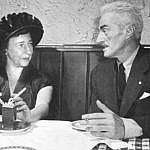From a Health Care Proxy to an Ethical Will, here are several tips on how to deal with end of life issues. Attorney and author Jo Kline Cebuhar shares her advice on end of life planning, based on her hospice work and experience with a series of losses – beginning with widowhood at age 28.
 “Losing loved ones, working with hospice patients, and now writing about death and dying has helped me appreciate the true fragility of life,” says Cebuhar. “I hope my experience with end of life issues has made me more sensitive to the unique history and perspective that each of us brings to life’s end, and every day that leads up to it.”
“Losing loved ones, working with hospice patients, and now writing about death and dying has helped me appreciate the true fragility of life,” says Cebuhar. “I hope my experience with end of life issues has made me more sensitive to the unique history and perspective that each of us brings to life’s end, and every day that leads up to it.”
Cebuhar is the author of EXIT – A novel about dying. It’s the story of dying – and living – in a hospice. She wanted to bring together stories of learning, loving and legacy at the end of life and share the legal concepts everyone needs to know to maintain autonomy until the very end. This novel will help you learn how to deal with end of life issues in a softer, gentler way than “just” reading online articles and books on how to deal with aging, illness, dying, and death.
5 Tips on How to Deal With End of Life Issues
A blog post like this can’t tell you everything you need to know about planning for the end of life, which includes sometimes difficult decisions about health care proxies, advanced directives, ethical wills, funeral wishes, and so on. Rather, this interview with Cebuhar is designed to help you start thinking about how to deal with end of life issues. It’s a simple introduction to planning for and coping with end of life issues.
Educate yourself about end of life issues and learn to communicate your wishes
Whether you’re nearing the end of your life or you’re learning how to deal with end of life issues for a loved one’s sake, education and communication are crucial to a patient-centered end-of-life. Each of us has an obligation to think about our wishes for care at life’s end, communicate our choices to our loved ones and appoint someone as a health care proxy – our advocate -in the event we are incapacitated at life’s end.
Knowing a patient’s wishes provides a care strategy for health care providers, as well as removing the decision-making burden from loved ones. But first, you have to know what the patient wants. This is one of the most important issues to deal with for end of life care.
Know the difference between a Living Will and a Do-Not-Resuscitate Order
One of the most common legal and/or ethical issues confronting people who are dying is ignorance on the part of the patient, loved ones and even health care providers. We often don’t know what our choices for end of life issues are, and the result is care that ignores a patient’s rights and wishes.
For example, recent studies of emergency care providers revealed gross misunderstandings about the difference between a Living Will and a Do-Not-Resuscitate Order. Such confusion on the part of medical personnel can result in tragic mistakes, which affects how we deal with end of life issues. Long before life’s end, patients need to understand options for care and effectively document their choices.
As a patient nearing the end of life, knowing your wishes and rights and communicating them – or having an advocate to speak for you – is key.
Give people permission to express their wishes about end of life care

How to Deal With End of Life Issues
Life’s end is still part of life. Each person has a unique perspective on “life” and what it means, perhaps most vividly when the end of life is near. Giving the patient permission to express his or her wishes for end of life care and then respecting those wishes – granting autonomy to the patient – is probably the simplest way to support someone who is dying.
This suggestion for how to deal with end of life issues applies to a doctor who makes sure he knows the terms of the patient’s Living Will or a spouse who accepts that the patient would prefer to discontinue treatments and allow the dying process to begin.
Remember that every day is part of your legacy
When I asked Cebuhar if there was anything else she thought people should know about how to deal with end of life issues, she encouraged us to remember that dying is part of living. To the last breath, each of us will continue to have the personality, the spirituality, the sense of humor, the fears, the opinions and the rights we have always had.
Think about what you stand for and how you wish to be remembered. Every day is a part of your legacy – and perhaps even your ethical will.
Consider an Ethical Will
An Ethical Will is a guide for passing on core values, self-reflection and storytelling and an action plan for everyday life. It can be effective and affirming to create your Ethical Will and use it to inspire your plans for charitable giving, health and end of life issues and estate distribution. In fact, your most valuable legacy is your Ethical Will – and it definitely should be considered when dealing with end of life issues.
An Ethical Will is a non-legal document that passes on heartfelt wisdom to future generations. This type of will can help dying patients share their final thoughts. Cebuhar is enchanted by the idea of passing on personal lessons — not just financial or legal assets. She even created her own Ethical Will, in the form of a PowerPoint slide show. In the New York Times article “The Ethical Will, an Ancient Concept, Is Revamped for the Tech Age” Cebuhar tells writer Constance Gustke how she shares intimate moments by using family photos, humor and even quotations that reflect her philosophy of happiness and gratitude.
“Slide shows have lots of impact because you can put images on them,” says Cebuhar, who wrote So Grows the Tree – Creating an Ethical Will – The Legacy of Your Beliefs and Values, Life Lessons and Hopes for the Future. “There’s an extra dimension, which appeals to a wider audience like younger people.”
End of life issues aren’t measured in just dollars and cents. An Ethical Will was first recorded more than 3,500 years ago, in the Book of Genesis. It was the message of Jacob’s hopes and blessings for his twelve sons. Since that time, Ethical Wills — a statement of one’s beliefs and values, life lessons and hopes for the future — have become treasured legacies throughout religious and secular history, whether expressed as a journal, collection of quotes, scrapbook, song, video or simple letter.

Jo Kline Cebuhar
About Jo Kline Cebuhar: It was after serving as volunteer chair of Iowa’s largest hospice that she began to write nonfiction books about end-of-life legal issues and the meaning of legacy. Her previous works include the award-winning Last Things First, Just in Case… The Practical Guide to Living Wills and Durable Powers of Attorney for Health Care and So Grows the Tree – Creating an Ethical Will. Cebuhar lives in West Des Moines, Iowa.
To learn more about Cebuhar, visit her blog So Grows the Tree.
If you have any thoughts on these tips on how to deal with end of life issues – including a health care proxy, do not resuscitate order, advanced directive, or other end of life planning – please comment below.
If you’re a widow, you may find Not Your Traditional Widows Support Group interesting.





